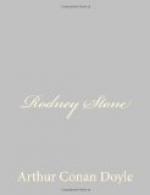“On how much, sir,” asked my father, “can a young man dress in town?”
“With prudence and reasonable care, a young man of fashion can dress upon eight hundred a year,” my uncle answered.
I saw my poor father’s face grow longer.
“I fear, sir, that Roddy must keep his country clothes,” said he. “Even with my prize-money—”
“Tut, sir!” cried my uncle. “I already owe Weston something over a thousand, so how can a few odd hundreds affect it? If my nephew comes with me, my nephew is my care. The point is settled, and I must refuse to argue upon it.” He waved his white hands as if to brush aside all opposition.
My parents tried to thank him, but he cut them short.
“By the way, now that I am in Friar’s Oak, there is another small piece of business which I have to perform,” said he. “I believe that there is a fighting-man named Harrison here, who at one time might have held the championship. In those days poor Avon and I were his principal backers. I should like to have a word with him.”
You may think how proud I was to walk down the village street with my magnificent relative, and to note out of the corner of my eye how the folk came to the doors and windows to see us pass. Champion Harrison was standing outside the smithy, and he pulled his cap off when he saw my uncle.
“God bless me, sir! Who’d ha’ thought of seem’ you at Friar’s Oak? Why, Sir Charles, it brings old memories back to look at your face again.”
“Glad to see you looking so fit, Harrison,” said my uncle, running his eyes over him. “Why, with a week’s training you would be as good a man as ever. I don’t suppose you scale more than thirteen and a half?”
“Thirteen ten, Sir Charles. I’m in my fortieth year, but I am sound in wind and limb, and if my old woman would have let me off my promise, I’d ha’ had a try with some of these young ones before now. I hear that they’ve got some amazin’ good stuff up from Bristol of late.”
“Yes, the Bristol yellowman has been the winning colour of late. How d’ye do, Mrs. Harrison? I don’t suppose you remember me?”
She had come out from the house, and I noticed that her worn face— on which some past terror seemed to have left its shadow—hardened into stern lines as she looked at my uncle.
“I remember you too well, Sir Charles Tregellis,” said she. “I trust that you have not come here to-day to try to draw my husband back into the ways that he has forsaken.”
“That’s the way with her, Sir Charles,” said Harrison, resting his great hand upon the woman’s shoulder. “She’s got my promise, and she holds me to it! There was never a better or more hard-working wife, but she ain’t what you’d call a patron of sport, and that’s a fact.”




